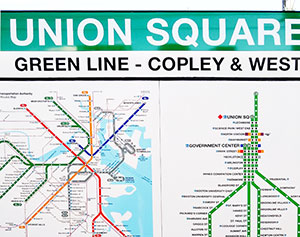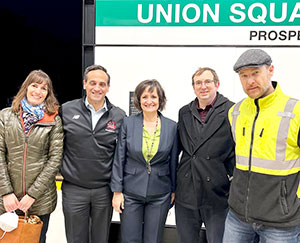
After years of hard work Union Square station opened on Monday, March 21. — Photo by Doug Holder
By Ryan DiLello
On Monday of this week, after decades of planning and debate, the city of Somerville celebrated the opening of the Green Line stop within Union Square. Last Thursday, Mayor Ballantyne held a press conference to field questions about the historic project from the community.
“My first introduction to the Green Line and transportation issues started in 1999, as a resident. In the early 2000s, I went to a number of state meetings with Mass DOT and MPO, to advocate for this,” the mayor said about the Green Line Extension. Her grade-school daughter spoke at one of those state meetings – to an audience of over 700 residents.
That was nearly 20 years ago. Today’s meeting drew rather few attendees, but the questions tackled large issues. First, how is the city planning to counteract the trends of gentrification that tend to accompany major upgrades in public transportation?

Mayor Ballantyne arrived at the new GLX station to take the first ride at 4:50 a.m. Monday morning. ~ Photo courtesy of Mayor Katjana Ballantyne
Mayor Ballantyne said that her primary objective is to prevent resident displacement and enable high-density residence near public transportation. To do so requires a healthy connection between jobs and housing, she explained. On the housing front, the city is working to increase affordable housing requirements and inclusionary zoning from 12.5% to 20%.
The mayor cited the newly created office of housing stability which assists residents facing displacement, the millions of dollars in rental assistance and legal services funding, and that Somerville ranks the highest in CPA funding for affordable housing in the state.
Additionally, the city is providing flex months for renters and homeowners. On the jobs side, the mayor noted that the city is working with developers on multiple initiatives like linkage funds to optimize plans for job creation on a local level.
Next, amidst threats of gentrification, how will Somerville concentrate on immigrants and lower-income residents in particular?
The mayor shared details of her background in advocacy work, mentioning that she primarily worked with women of color who lived in subsidized housing. “I want Somerville to be an inclusive, equitable city,” The mayor said. She noted that the city recently hired an economic development planner for women and minority owned businesses and is in the process of hiring a director of strategic planning and equity.
Clarifying that investing in people was equally important as spaces, the mayor mentioned the offices of Immigrant Affairs and the new Department of Racial Social Justice.
Next, how would the Green Line transform Somerville?
“I hope that, whoever the next governor is, that they understand how important transportation is,” Ballantyne said. “The migrations are to the urban core. Boston and Cambridge have been the job creators for the last decade and Somerville has been the dormitory. So, the hope is that there starts to be a balance for the city.”
The mayor also mentioned the improvement in air quality, the local mitigation of climate change, and the growth of housing as incentives for the Extension.
Lastly, given the expected economic pressures on low-income residents, is it time for Somerville to consider rent control?
“We have to use every tool possible to try to do this. We have a long list of tools that we’ve used here in Somerville.” The mayor said, but did not give a definitive answer as to whether the city will consider rent control anytime soon.















Reader Comments